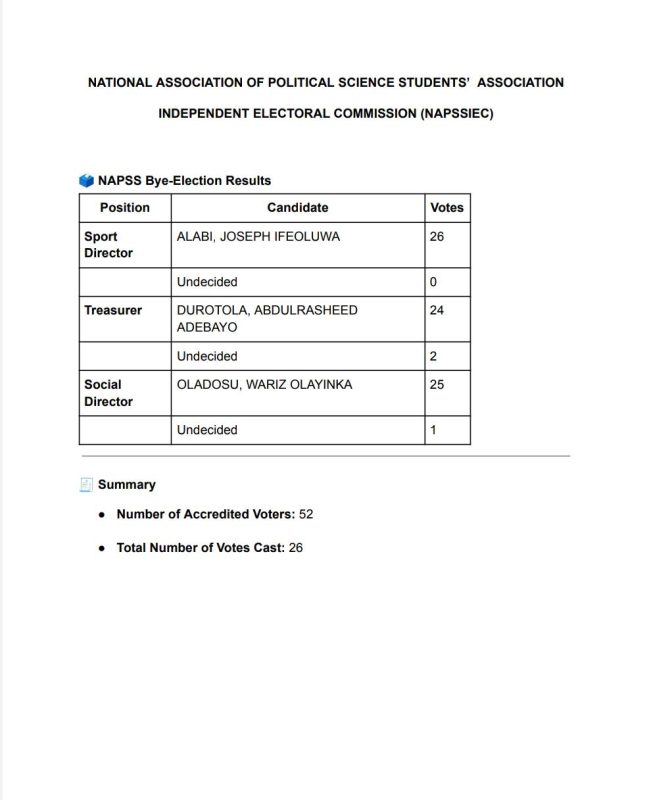
Following the sociological functionalist theory on the educational institution, the school is a society in miniature, meaning what happens in the school is a reflection of the outer society.
Election is believed to be the heart of every democracy, of which one of the striking features of election is popular sovereignty, can it still be called election if the sovereignty is “unpopular”. It is not news anymore that the NAPSS bye-election held on May 22, 2025, produced three new executives.
What continues to spark conversation, however, is the low level of engagement. This election revealed a troubling pattern of persistent voter apathy and declining political engagement within NAPSS. Out of 200+ eligible voters, only 52 were accredited, and only 26 casted their vote.
This turnout shows that less than 13% of the NAPSSites show serious interest in the activities of the association and this raises serious concerns about voter engagement and the health of our democratic processes if this can be called a system where the majority decides the fate of the association, in this case the majority are nowhere to be found.
A significant factor contributing to this low turnout appears to be the inadequate publicity efforts by the electoral committee, NAPPSIEC. The number of the people in the committee happened to be 10 as said by the PRO of the Committee, Abdullateef Jamiu, however, out of the 10 committee members, only three were actively engaged in the electoral process and publicity.
This lack of active participation by other members, saddling the responsibility of just three likely led to insufficient dissemination of information regarding the election, leaving many potential electorates unaware or uninformed. In an association where political apathy eats deep, can we rely on sending mere broadcast messages via the official NAPSS group as a form of publicity?On the day of the election, NAPSS Independent Electoral Commission also seems less bordered about the level of awareness of electorates, the Committee members did not really converge to see to that, but just met at the faculty for some minutes towards the end of the election, no provision for students to vote offline especially for those who do not have access to online voting.
Equally concerning is the apparent lack of initiative from the candidates themselves. Many failed to submit declarations of intent or engage in meaningful outreach to the electorate. Isn’t it justified NAPSSites refused to vote, since they have no knowledge of the aspirants vying for the position, talk more of assessing their manifestoes to scrutinize the plans these aspirants intend to execute during their tenure.
A 400level student stated that he didn’t complete his accreditation process because he didn’t see the outreach of any of the candidates.“ I intentionally did not do my accreditation since I don’t know any of the aspirants” said another NAPSSite. In a case where the candidate vying for the position of the “social” director is not recognised by most students in the association. Who do NAPSSites turn to for the payment of their dues, if the treasurer is not recognised?
The Committee also see no reason in essence of candidates pushing out their declaration of intents because none of the 3 candidates who went unopposed declared their intents to NAPSSites especially NAPSS general groups where most electorates belong to. This lack of engagement may have contributed to a perception that the election was inconsequential, leading to voter apathy. This low turnout is a clear reflection of the poor publicity and engagement surrounding the election.
Frankly, it raises concerns that the focus may have been more on purchasing a ₦2,000 nomination form than on campaigning or engaging the electorate.To address these issues and enhance voter participation in future elections, the following steps are recommended:
Strengthen Electoral Committee Engagement: Ensure all committee members are actively involved in the electoral process, not a situation where only the committee chairman will be the one who will be actively involved in all the process. Other members must also work with adequate and clear minds to be responsible and accountable.
Enhance Publicity Efforts: Utilize multiple communication channels to disseminate election information widely, we are in the digital era where every information can be shared online but that shouldn’t limit physical engagement with the electorate from the candidates. This will ensure all eligible voters are informed about the election details and the importance of their participation.
Encourage Candidate Outreach: NAPSSIEC should require candidates to submit declarations of intent and engage in voter outreach activities even if it is a by-election. People must get to know who is to runs the administration..
Monitor and Evaluate Electoral Processes: If an election is scheduled online and low turnout is being noticed in the process. The electoral committee should have established mechanisms to provide an avenue to cast their vote physically even if it will be by providing a gadget that everyone can use at a particular venue.
By implementing these recommendations, one can work towards not just fostering a more engaged, participants, and informed electorate but also a well organized Electoral Commission and responsible ruling class, thereby strengthening the democratic process within the organisation.
